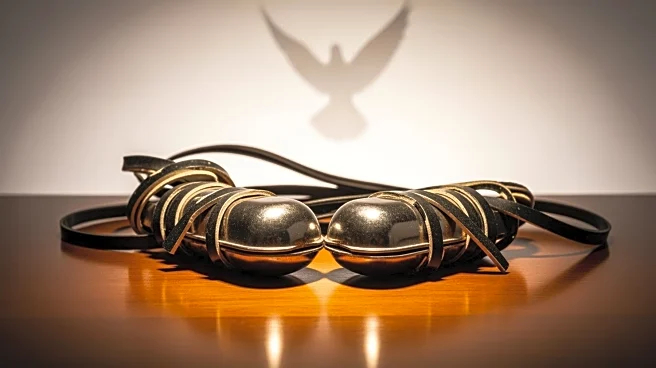What's Happening?
Bar Kupershtein, a former hostage held by Hamas in Gaza for 738 days, participated in a significant tefillin-laying event at Hostages Square in Tel Aviv. The event was organized to call for the return
of 11 hostages whose remains have not been returned to Israel. Kupershtein, who was deeply moved by the occasion, shared his experiences of captivity and the faith that sustained him. He emphasized the importance of prayer and faith, contrasting his prayers for life with the prayers of his captors. The event was attended by notable figures, including former chief rabbi of Israel David Lau and Rabbi Shlomo Raanan. Kupershtein's father, Tal, who had learned to stand again to embrace his son upon his return, participated in the ceremony, adding a deeply personal element to the event.
Why It's Important?
The ceremony highlights the ongoing emotional and political impact of hostage situations on Israeli society. Kupershtein's story of resilience and faith serves as a powerful narrative of hope and healing, resonating with many who have been affected by similar situations. The event underscores the broader issue of hostages and missing persons in conflict zones, drawing attention to the need for continued efforts in diplomacy and negotiation for their return. It also reflects the cultural and religious significance of tefillin in Jewish tradition, symbolizing a return to faith and community after a period of hardship.
What's Next?
The event may prompt further public and governmental attention towards the issue of hostages, potentially influencing diplomatic efforts to secure their return. It could also inspire similar gatherings and initiatives aimed at raising awareness and fostering community support for affected families. The involvement of religious leaders and organizations suggests a continued role for faith-based initiatives in addressing and healing the wounds of conflict.
Beyond the Headlines
Kupershtein's experience and the ceremony highlight the complex interplay between personal faith and public advocacy in the context of geopolitical conflicts. The event serves as a reminder of the human stories behind political issues, emphasizing the need for empathy and understanding in international relations. It also raises questions about the role of religious and cultural practices in personal and collective healing processes.








